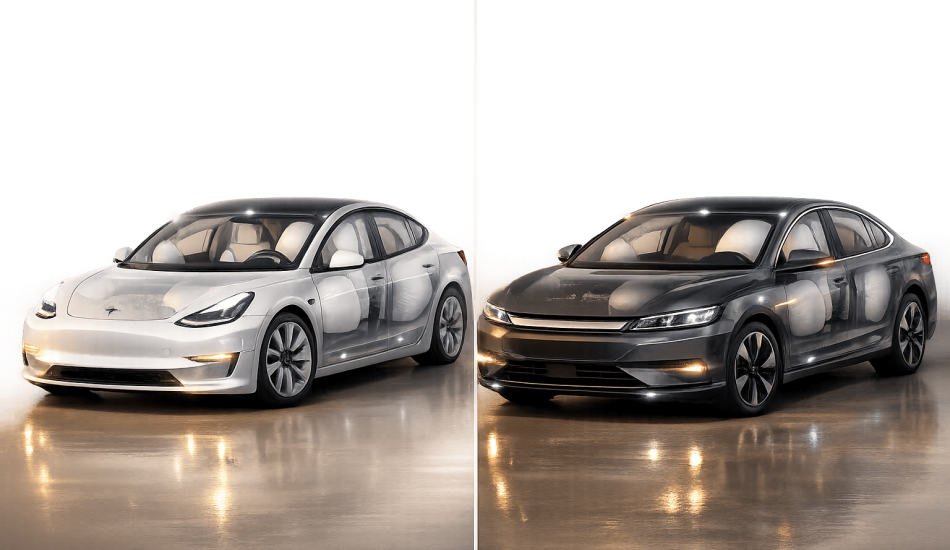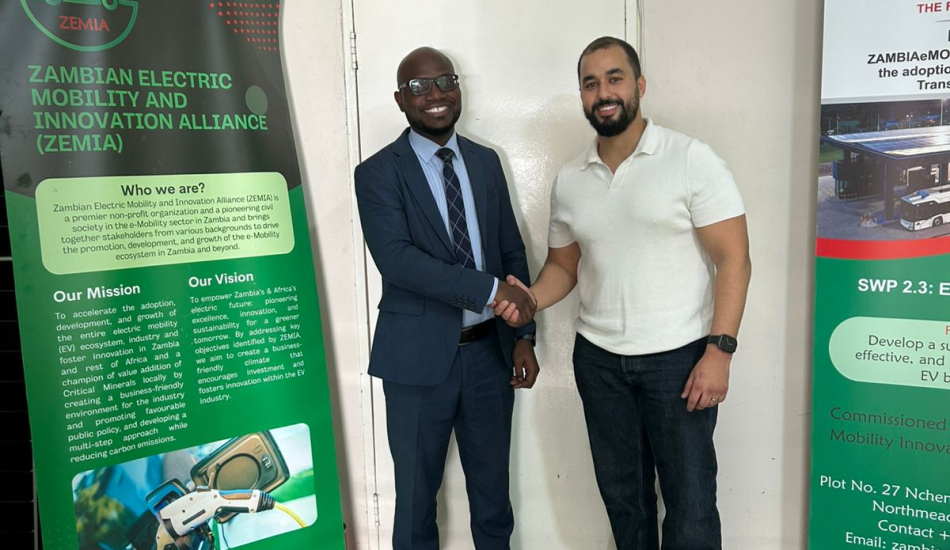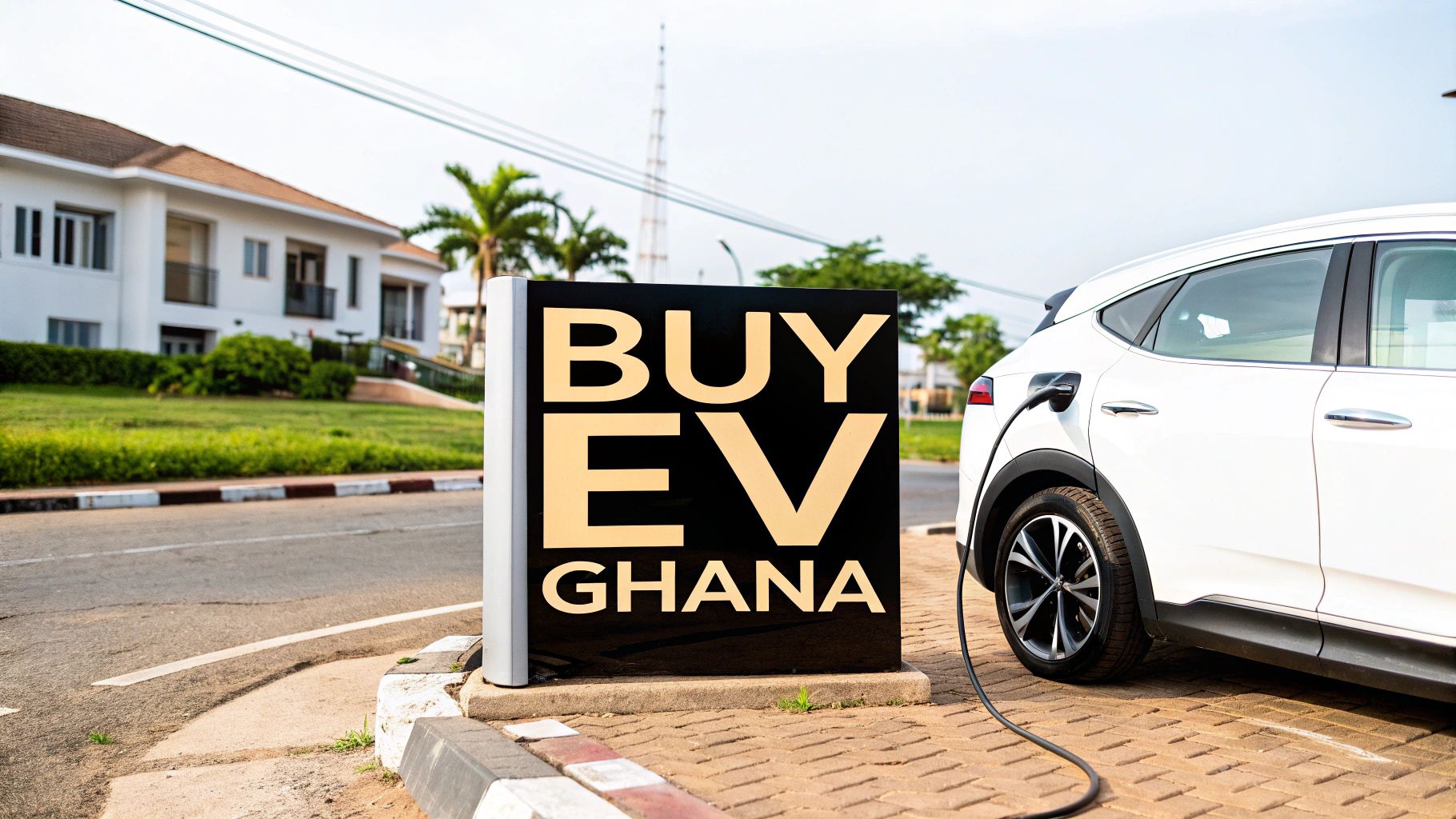
Thinking about switching to an electric vehicle in Ghana? You're not alone. The country is quickly becoming one of the most promising spots for EV ownership in the region. Factors like ever-climbing fuel prices, a growing eco-consciousness, and helpful government policies are making it more practical than ever to buy an electric car in Ghana.
Why Ghana Is Gearing Up for the EV Shift
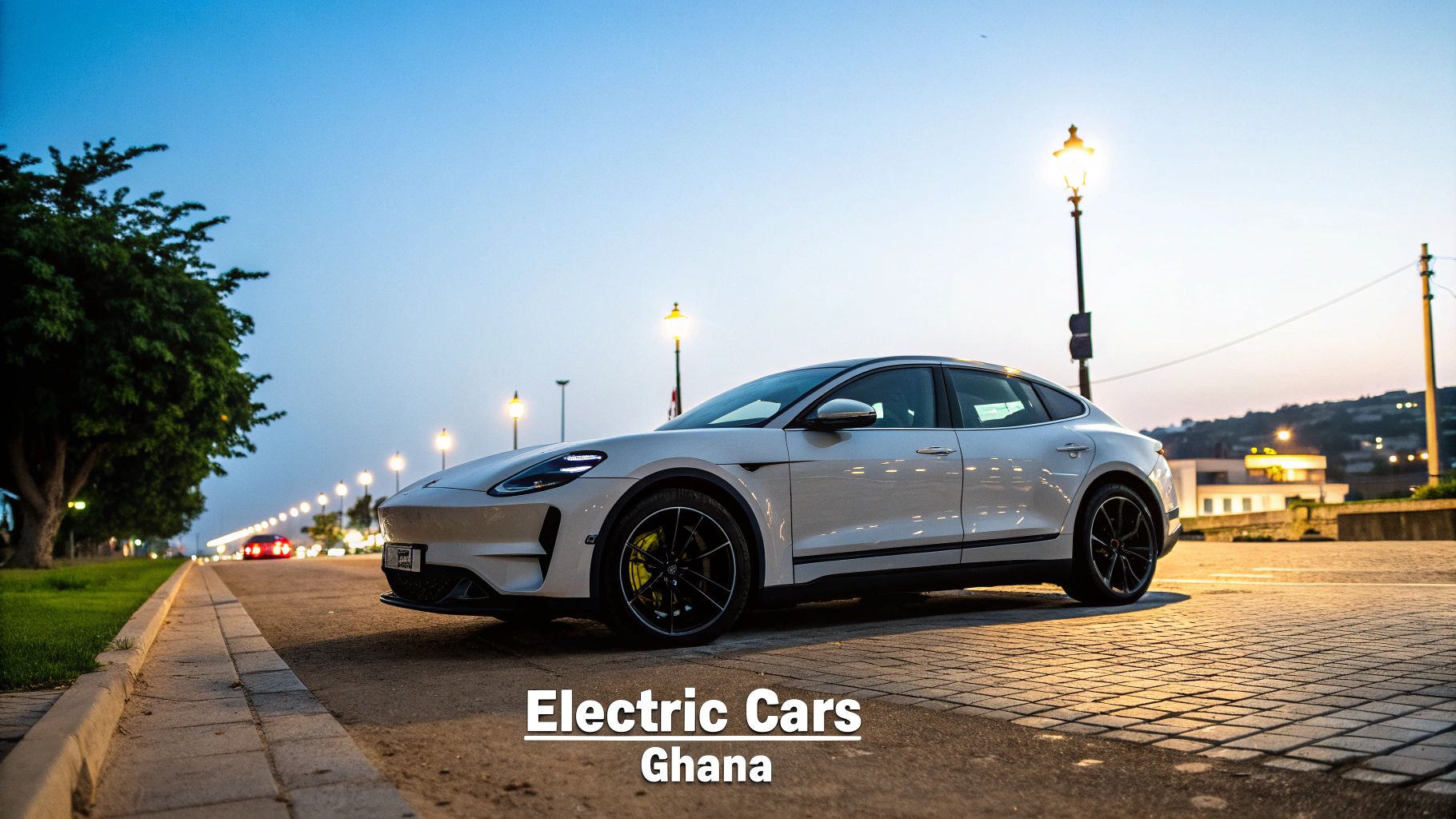
What once felt like a distant dream—driving an electric car in Ghana—is now a tangible option for many. This isn't just a coincidence. It's a shift driven by real-world pressures and a genuine desire for a cleaner way to live. Every time fuel prices spike in Accra or Kumasi, the thought of simply plugging in your car at home becomes much more appealing than waiting in line at the pump.
But it goes deeper than just saving on fuel. We're seeing a real change in how people think. Ghanaians are more aware of air quality and environmental concerns, which makes the zero-emission appeal of EVs hard to ignore. This isn't just a topic for tech enthusiasts anymore; it's a conversation happening around family dinner tables and in business meetings.
The Market Is Warming Up, and the Government Is Helping
You can feel the momentum building. Ghana is carving out a role as a leader in West Africa's EV scene. In fact, some forecasts suggest we could see around 17,000 electric vehicles on our roads by 2025, which would put the nation right at the heart of the region's green transport movement.
A huge part of this growth comes from smart government policies. For instance, duty waivers on electric two- and three-wheelers are already making a difference, opening the door for more people to access affordable electric transport. For a closer look at the regional trend, the analysis on West Africa's EV growth from ev24.africa offers some great insights.
This supportive climate means more EV models are showing up in the country. Your choices are no longer limited to just a few niche options. The market is now seeing:
- Compact City Cars: Ideal for zipping through urban traffic.
- Family-Friendly SUVs: Providing the space and robustness that Ghanaian families need.
- Electric Motorbikes (Okadas): A cost-effective and efficient solution for both personal and commercial use.
Before you dive in, it's worth taking a moment to consider the key elements involved. This table breaks down the essentials to help you get started on the right foot.
Key Factors for Buying an EV in Ghana
| Factor | What to Consider | Importance |
|---|---|---|
| Charging Infrastructure | Can you charge at home? Where are the public charging stations on your typical routes? | High |
| Vehicle Range | How far can the EV go on a full charge? Does it meet your daily commute and travel needs? | High |
| Total Cost of Ownership | Look beyond the purchase price. Factor in savings on fuel, maintenance, and potential tax benefits. | High |
| Model Availability | What brands and models are actually available for import or local purchase in Ghana? | Medium |
| After-Sales Support | Is there a reliable service centre with technicians trained to handle EV maintenance and repairs? | Medium |
| Grid Reliability | How stable is the power supply in your area for consistent home charging? | Medium |
Weighing these factors from the beginning will make your entire buying process smoother and ensure your new EV fits seamlessly into your lifestyle.
Better Infrastructure and Growing Confidence
Let's be honest: "range anxiety" and concerns about the power grid have been major hurdles. But Ghana has been making real progress in stabilising its grid. This improvement means that charging your car at home is becoming a reliable, everyday reality for more and more people. The old fear of being stranded with a dead battery is slowly fading as the supporting infrastructure gets stronger.
The decision to buy an electric car in Ghana is no longer a leap of faith. It’s a practical choice backed by sound economics, a sense of environmental responsibility, and an improving local ecosystem that’s ready to support it.
As the charging network continues to expand and more mechanics get the training they need for EV maintenance, the final pieces are clicking into place. The path to owning an electric vehicle in Ghana is clearer and more accessible than ever, paving the way for a cleaner, quieter, and more sustainable future on our roads.
Choosing an EV Built for Ghanaian Roads
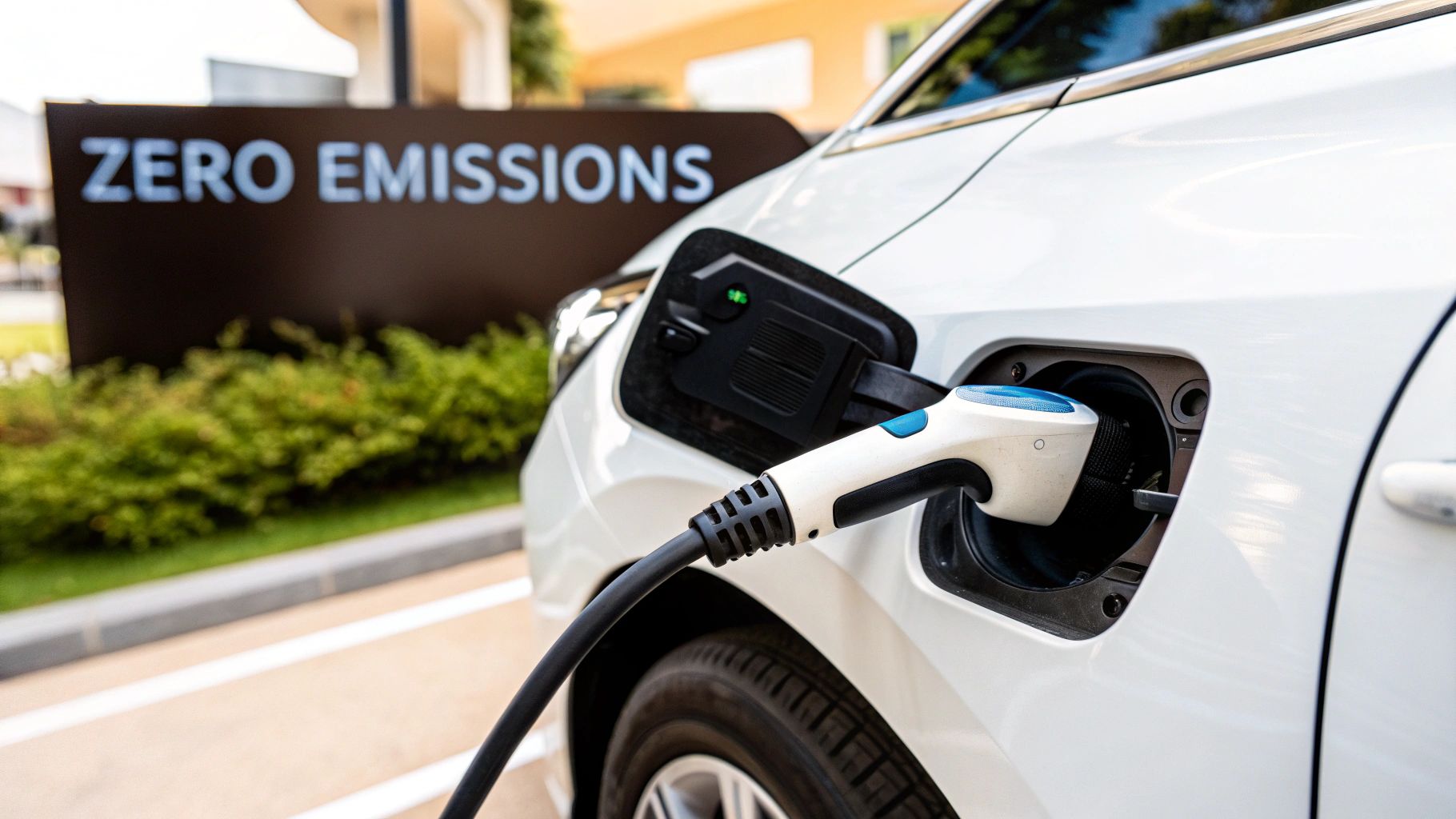
When you start looking for an electric vehicle in Ghana, it’s easy to get caught up in the sleek designs and flashy brand names. But the real challenge is finding a car that can handle our local terrain. A vehicle that glides down a European motorway might not fare so well with Accra's stop-and-go traffic or the unpaved roads you’ll find outside the city.
The trick is to match the car’s capabilities to your actual, everyday life. Before you even look at models, think about your typical week. Are you mostly driving around the city, or do you frequently travel between regions? Answering that simple question is the first step to making sure you buy an electric car in Ghana that truly works for you.
Prioritising Range and Battery Durability
Everyone talks about battery range, but here in Ghana, it’s about more than just a number on a spec sheet—it’s about practical freedom. That advertised range is almost always based on perfect conditions, which we rarely get. Heavy traffic on the N1, blasting the air conditioning to beat the heat, and hilly roads will all eat into your battery.
If you’re a city commuter, a model with a real-world range of around 250-300 km will likely be more than enough. But if your work or family life involves regular trips from Accra to Takoradi or Kumasi, you’ll want to look for something closer to 450-500 km to avoid the stress of "range anxiety."
Our tropical climate adds another layer to consider: battery health. High temperatures can cause a battery to degrade faster over time. This is where you need to look for models with solid thermal management systems.
- Liquid Cooling Systems: These are the gold standard. They do a fantastic job of keeping the battery at its optimal temperature, which goes a long way in extending its lifespan and maintaining its range.
- Air Cooling Systems: While simpler, they still offer a good level of protection, especially for smaller EVs used for shorter city trips.
A car's battery is its heart. Think of a robust thermal management system as a strong defence against our warm climate, ensuring it performs reliably for years to come.
Ground Clearance and Suspension Are Non-Negotiable
Let's talk about something that's often overlooked but is absolutely critical for our roads: ground clearance. Potholes, unforgiving speed bumps, and uneven surfaces are just part of the daily drive here. An EV with low ground clearance might look great, but it’s just not practical for many of our roads and could lead to some very expensive undercarriage damage.
You should be looking for a vehicle with a minimum ground clearance of 170mm (6.7 inches). This gives you a decent buffer for navigating most urban and semi-urban roads without constantly cringing at every bump. This is why compact SUVs and crossovers are often a much smarter choice than sedans.
Just as important is a tough suspension system. A suspension designed for perfectly smooth asphalt won't last long here. Look for vehicles known for their durability and solid build, ones that can absorb the shocks from rough patches without rattling your teeth or compromising the handling.
New Versus Used: What Makes Sense?
The classic "new vs. used" debate gets a bit more interesting with EVs in Ghana. A brand-new electric car gives you the latest tech, a full manufacturer's warranty, and a battery in perfect health. Of course, it also comes with a premium price tag.
On the flip side, a used EV can be a much more affordable entry point. The key is to do your homework, paying very close attention to the battery’s health. Most modern EVs can generate a battery health report showing its current capacity compared to when it was new. A used EV that still has 85-90% of its original battery capacity can be a fantastic deal, offering years of reliable service.
Let’s imagine a couple of scenarios:
- The Daily City Commuter: For someone sticking to Accra, a used Nissan Leaf or Hyundai Kona Electric could be a perfect, budget-friendly option. Their range is plenty for daily errands, and they’re small enough to park and navigate through traffic easily.
- The Inter-City Professional: If you're constantly travelling between major cities, you need rock-solid reliability and, most importantly, range. A newer model like the BYD Atto 3 or a Tesla Model 3 Long Range would be a much better investment, ensuring you can make those journeys on a single charge.
Ultimately, the right choice boils down to your budget and your daily needs. By focusing on these practical factors, you can find an EV that isn't just a car, but a true partner for your life in Ghana.
A Practical Guide to Importing Your EV
Bringing an electric car into Ghana can seem like a daunting task, filled with paperwork and red tape. But honestly, it’s far more manageable than you might think. With a bit of preparation, you can navigate the entire process—from finding your perfect EV abroad to driving it out of the Port of Tema—without any major drama.
This is more than just buying a car; it's a logistics project. Your success boils down to three things: understanding the documents, anticipating the costs, and finding the right people to help you on the ground. Let's break it down.
Your Essential Document Checklist
Before your EV even gets loaded onto a ship, you need to have your paperwork sorted. I can't stress this enough: a single missing document can lead to frustrating delays and expensive storage fees at the port. It's always better to be over-prepared.
Make sure your file includes these essentials:
- Original Bill of Lading (B/L): This is the most critical document. It’s basically the title deed for your car while it's in transit. Double-check that your name and all details are 100% accurate.
- Commercial Invoice or Bill of Sale: This proves you own the car and states its value, which is what customs will use to calculate your duties.
- Packing List: While this is more common for containers with lots of goods, it’s good practice to have a list detailing the car and any extras you've shipped with it, like a home charger.
- Certificate of Title and Registration: These are the car's official records from its country of origin, proving its history and legal status.
Getting these documents organised long before the car lands is non-negotiable. It’s the bedrock of a smooth clearance process.
Expert Tip: The moment you get a document, scan it or take a clear photo. Save digital copies in a cloud folder (like Google Drive or Dropbox). If the original papers get lost or delayed in transit, this simple step can be an absolute lifesaver.
Calculating Import Duties and Taxes
This is where most people get a little nervous, and for good reason. The final cost to buy an electric car in Ghana via importation can be tricky to predict. All charges are calculated based on the Cost, Insurance, and Freight (CIF) value of your vehicle. That means the total dutiable value is the price you paid for the car, plus the shipping cost, plus the insurance premium for the journey.
Several different levies are then applied to that CIF value. You’ll typically see charges for Import Duty, VAT, NHIL (National Health Insurance Levy), and the GETFund Levy, alongside various port handling fees. The good news? Ghana's policies are shifting to encourage green transport, so EVs sometimes get a friendlier duty structure than petrol or diesel cars.
Your best move is to get a detailed quote from a clearing agent before you ship the car. They can create a proforma invoice that estimates all the government charges and their service fees, so you have a realistic budget and aren't caught off guard. For a deeper dive into the numbers, our comprehensive Ghana EV import guide on tariffs and registration breaks it all down.
Finding a Reliable Clearing Agent
Your clearing agent is your single most important ally in this entire process. Think of them as your representative at the port, the person who deals with the complexities of customs so you don’t have to. Choosing a good one is the difference between a seamless experience and a costly, frustrating nightmare.
Don't just look for any agent; find one who has specific, proven experience clearing electric vehicles. They’ll know the correct Harmonized System (HS) codes and will be up-to-date on any government incentives you might be able to claim. Resist the temptation to go with the cheapest quote—reputation and experience are far more valuable here.
Before you commit, ask for references from other people who have imported EVs. A professional agent will communicate clearly, offer transparent pricing, and keep you in the loop at every stage.
This infographic simplifies the charging process, a key part of owning an EV in Ghana.
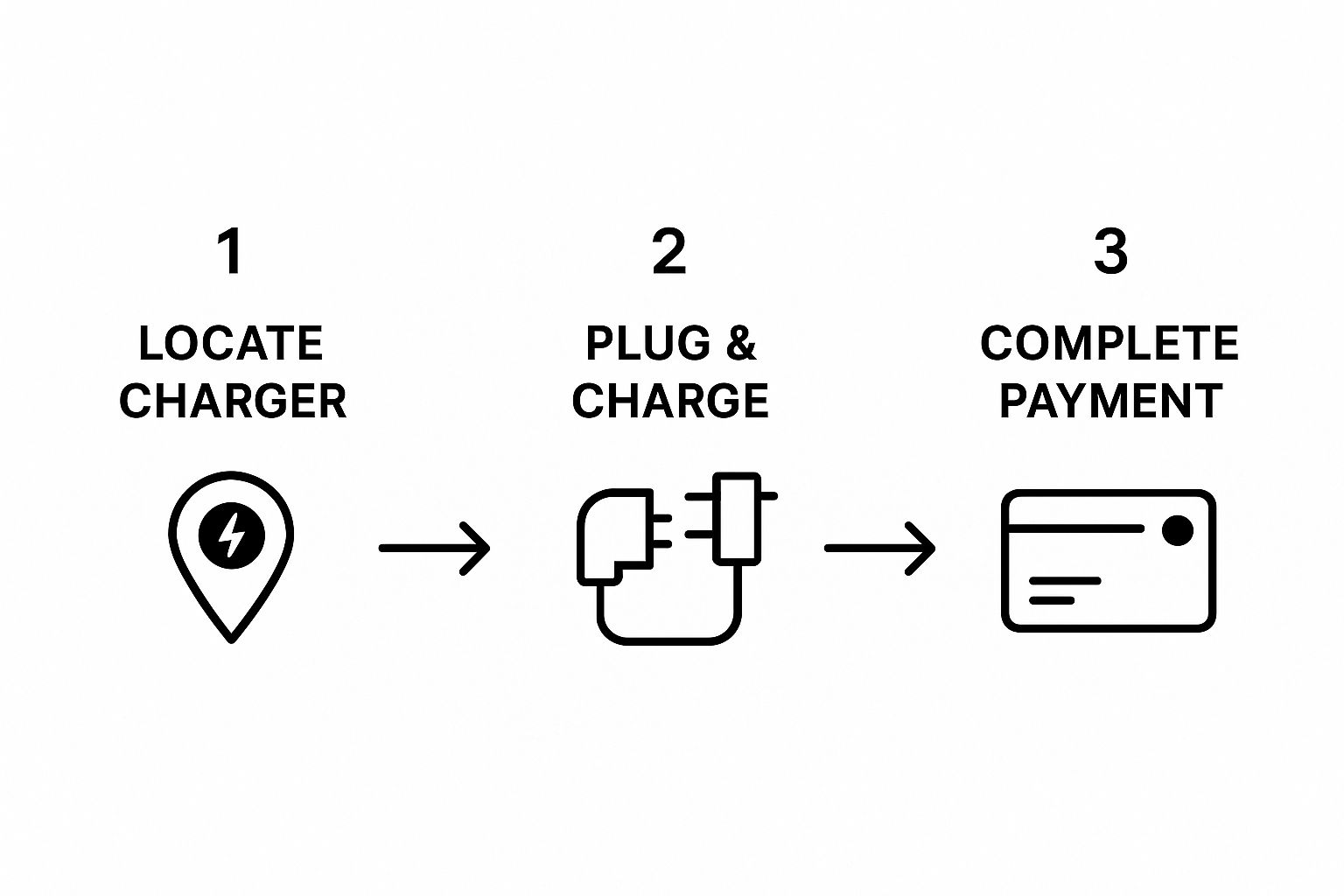
The flow from locating a charger to payment highlights the growing simplicity and user-friendliness of the public charging network.
Navigating Customs Clearance Smoothly
The moment your EV arrives at the Port of Tema, the clock starts ticking on potential port storage fees. Your clearing agent will take your documents and submit a declaration into the Ghana Customs Management System. From there, a customs officer will physically inspect the vehicle to verify it matches the paperwork.
This is where absolute accuracy pays off. Any difference between your documents and the car itself—whether it’s the model year, the trim level, or an accessory you forgot to mention—can trigger a re-evaluation. That means higher duties and potential penalties.
To make sure your car clears customs without a hitch, follow these simple rules:
- Send Documents Immediately: Get all the required paperwork to your agent the second you have it. Any delay on your part directly translates to a delay at the port.
- Declare the Honest Value: Don’t be tempted to under-declare the car's price. Customs officials are experienced at valuing vehicles and will spot an undervaluation, which always results in fines.
- Stay in Touch: Check in with your agent for regular updates. Being proactive helps you solve small problems before they become big, expensive ones.
Bringing your own EV into the country is completely achievable. If you focus on meticulous paperwork, understand the costs upfront, and choose a great clearing agent, you’ll be on the road in your new electric car in no time.
How to Finance and Insure Your Electric Car
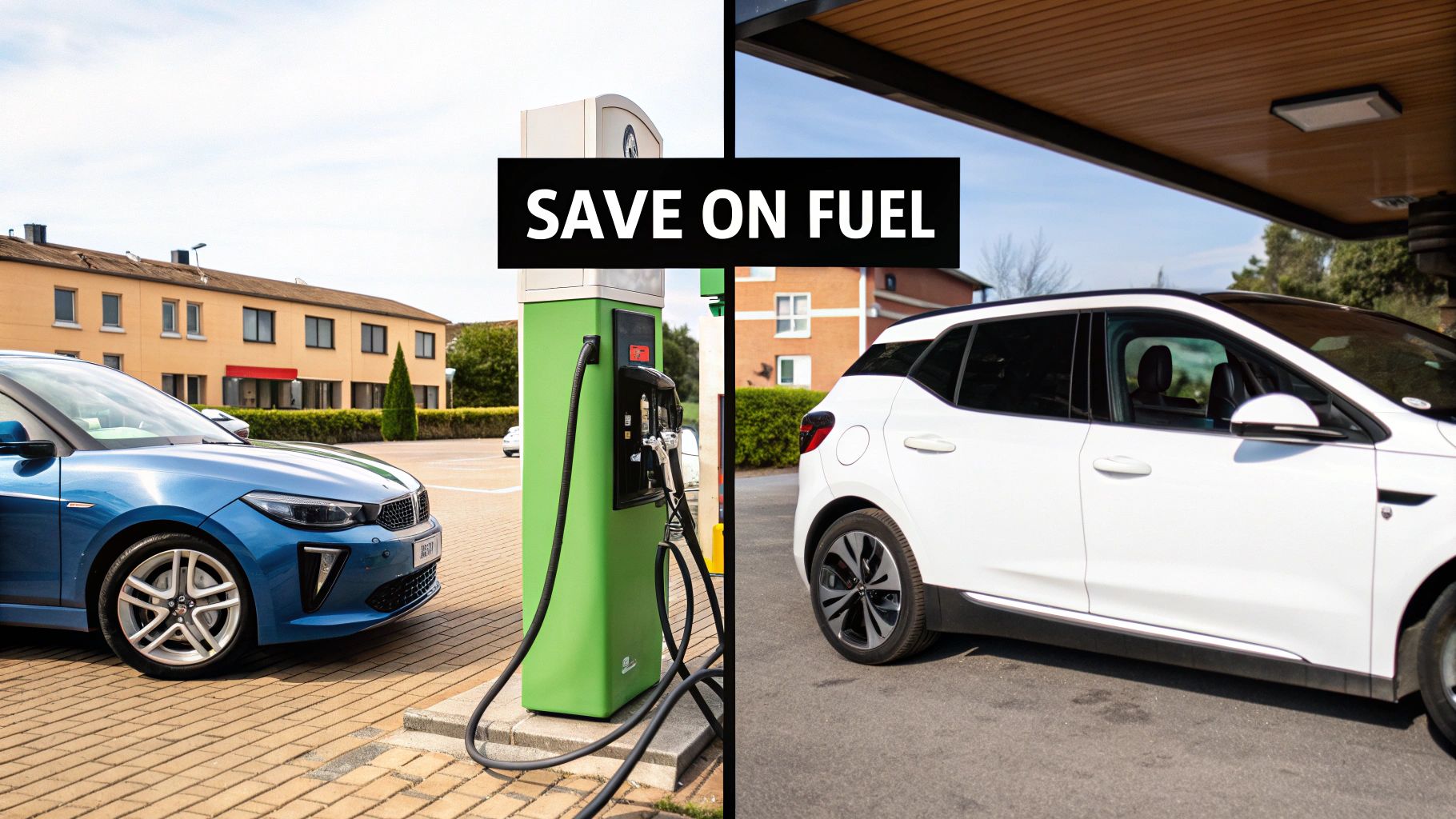
So, you’ve found the perfect EV for Ghanaian roads. Fantastic. The next step is sorting out the money and getting your new investment protected. Financing and insurance can feel like a bit of a maze, but they're pretty straightforward once you know the lay of the land.
The financial scene in Ghana is catching up to the EV revolution, which means more options are becoming available for people like you. The trick is to have a solid plan. You need to know how banks view EV loans, what paperwork they'll ask for, and how insurance companies figure out the premiums for these high-tech vehicles. Get these sorted, and you'll be on the road to a financially sound EV purchase.
Securing an Auto Loan for Your EV
Most major banks in Ghana will give you an auto loan that covers an electric vehicle. You might not find many loans specifically branded as "green," but that’s changing. At the end of the day, what lenders really care about is your ability to pay them back and the value of the car, whether it’s electric or petrol.
That said, some banks are starting to see the bigger picture. They recognise that EVs have lower running costs, which can actually strengthen your loan application.
When you walk into the bank, don't just talk about the sticker price. Come prepared to discuss the total cost of ownership. Highlighting how much you'll save on fuel and maintenance shows you've done your homework and can make your application much more compelling. It’s also a smart move to get a handle on understanding auto loan pre-approval before you even start negotiating with sellers; it puts you in a much stronger position.
To get your application ready, make sure you have these documents handy:
- Proof of Income: Your last three to six months of payslips or business statements should do the trick.
- Identification: A valid Ghana Card or passport.
- Proof of Residence: A recent utility bill is perfect for this.
- Vehicle Proforma Invoice: This is the detailed quote from the seller that breaks down the car's cost.
Key Takeaway: Financing an EV in Ghana is more about your financial standing than the car's power source. Banks are warming up to electric vehicles, and a well-prepared application that spells out the long-term savings can give you a real edge.
Comparing Auto Loan Features for EVs vs Petrol Cars
When you're looking at financing, the details can differ slightly between an electric car and a traditional one. Here’s a quick comparison of what you might encounter in Ghana.
| Feature | Electric Vehicle (EV) Loan | Petrol/Diesel Car Loan |
|---|---|---|
| Loan-to-Value (LTV) | Can sometimes be higher due to the perceived lower depreciation of some EV models. | Standard LTV ratios based on the vehicle's market value and age. |
| Interest Rates | Generally similar to standard auto loans, though some banks might offer preferential rates. | Standard market rates apply, based on credit score and loan term. |
| Loan Term | Typically 3-5 years, similar to conventional loans. | Standard terms, usually up to 5 years for new cars. |
| Required Documents | Standard documents plus a proforma invoice specifying the EV model and battery specs. | Standard income, ID, and residence proofs, plus the vehicle's invoice. |
| Lender's Focus | Your creditworthiness and the EV's long-term value and lower running costs. | Primarily your credit history and the established resale value of the car model. |
While the core requirements are similar, framing your EV purchase around its economic benefits can sometimes lead to more favourable terms as lenders become more familiar with the technology.
Navigating EV Insurance in Ghana
Getting your electric car insured involves a few special considerations. Insurers calculate premiums based on the car's value, the potential cost of repairs, and how easy it is to find qualified technicians and parts. Since many EVs have a high sticker price and are packed with advanced tech—like that huge battery pack and all those sensors—repair bills can be higher than for a typical car.
This means you need an insurer who actually gets EVs. Don't even consider anything less than a comprehensive policy. Crucially, you must confirm that the policy specifically covers the battery pack against damage, as it's by far the most expensive part to replace. It's also wise to ask about their network of approved repair shops to make sure they have people who are actually trained to work on electric vehicles.
The rise of EVs is part of a bigger story. Ghana's automotive industry, projected to be worth around $1.93 billion in 2025, is growing fast, and electric vehicles are carving out their space within it. As the market matures, we can expect to see more specialised insurance products become available.
Comparing Your Financial Options
While a bank loan is the most common path, it's worth keeping an eye on other financing models that are popping up across the continent. These could become more common in Ghana over time.
For a wider look at what's out there, check out our guide on the 5 ways to finance your electric vehicle purchase in Africa. It offers a broader perspective that can help you make a fully informed decision. Taking the time to lock in the right financing and insurance will give you peace of mind and make the switch to electric driving a smooth and confident journey.
Life After Purchase Registration Charging and Maintenance
Your electric vehicle has finally arrived on Ghanaian soil—an exciting moment that brings you one step closer to cleaner, quieter driving. But before you take it out for a spin, there are three crucial areas to tackle: legal registration, a reliable charging setup, and a solid maintenance plan. Nail these, and you’ll avoid headaches down the road.
Navigating these tasks might feel like ticking boxes on a to-do list, but each one lays the groundwork for trouble-free ownership. Let’s dive into how you can turn import paperwork into a road-ready EV in Ghana.
Getting Your EV Registered With the DVLA
Driving around without a valid Ghanaian plate isn’t an option. Registration with the Driver and Vehicle Licensing Authority (DVLA) formalises your ownership and assigns you a local number.
Gather these documents before heading to any DVLA office:
- Customs Clearance Documents: Proof that duties and taxes are settled.
- Bill of Lading: The original shipment and ownership certificate.
- Vehicle Title and Registration: Your car’s home-country registration papers.
- Proof of Identity: Ghana Card or another government-issued ID.
A DVLA inspector will check the Vehicle Identification Number (VIN) and other details against your paperwork. Once everything matches, you’ll walk away with:
- Registration Certificate
- Roadworthiness Certificate
- New Number Plates
Remember to ask whether your clearing agent includes DVLA registration in their package. Clarifying this early prevents unnecessary delays and surprise charges.
Setting Up Your Charging Solution
Now the big question: where will you plug in? Most EV owners in Ghana rely on in-home charging, and with good reason.
A dedicated Level 2 home charger—installed by a qualified electrician—cuts charging time dramatically. In fact, these units can fill your battery three to seven times faster than a basic wall socket. An overnight top-up means you’re fully charged every morning.
Yet home charging isn’t your only option. Public chargers are popping up, especially along major routes linking Accra, Kumasi and Takoradi. Many drivers are on the lookout for rapid Level 3 chargers, which can boost your range significantly in just 20–30 minutes.
Finding Reliable Maintenance and Support
Electric cars require less routine servicing than petrol vehicles—no oil changes or exhaust checks—but they still need expert care. Brakes, tyres and suspension all demand attention. And if the high-voltage battery or electric motor throws a fault, you want someone who knows exactly what they’re doing.
Here’s how to stay ahead of any repair surprises:
- Identify EV-friendly workshops before a warning light appears.
- Keep tabs on suppliers for small but essential parts, like charging port covers or sensors.
- Join local EV owner groups on social media for real-world tips on mechanics, parts availability and community support.
By registering promptly, choosing the right charger and lining up expert maintenance, you’ll turn your imported EV into a dependable daily driver. Enjoy the silence, the savings and the smooth acceleration—Ghana’s roads are ready for you.
Your Top Questions About Buying an EV Answered
As you get closer to choosing your electric car, a few final questions are bound to come up. We get it. This is where we’ll tackle the practical, real-world concerns we hear most often from Ghanaians thinking about making the switch. Think of this as a straight-to-the-point chat to clear up any last-minute doubts.
How Does Ghana’s Heat Really Affect an EV Battery?
This is a very smart question, and one we hear a lot. High temperatures can indeed speed up battery degradation over time, but modern EVs are built with this in mind. The vast majority of quality electric cars come with sophisticated thermal management systems, often using liquid cooling to keep the battery pack in its ideal temperature range.
So, while the heat is certainly a factor, it doesn't have to be a deal-breaker. A car with a solid cooling system will actively protect its battery, ensuring it serves you well for many years. When you're shopping around, it's wise to favour models known for their robust battery management.
What Are the Actual Long-Term Savings?
The initial price tag of an EV can look intimidating, but the savings start rolling in almost immediately. Fuel is your biggest win. With the unpredictable nature of petrol prices, charging your car at home gives you stable, significantly lower running costs. Most EV drivers in Ghana tell us their monthly "fuel" bill drops by 60-70%, sometimes even more.
Then you have maintenance. Forget about oil changes, spark plugs, or exhaust systems. Your routine servicing costs are slashed. Add it all up, and over five years, these combined savings can easily cancel out the higher purchase price, making an EV a very shrewd financial decision in the long run.
What About the Resale Value of EVs in Ghana?
It’s true that the used EV market in Ghana is still finding its feet, but the outlook is incredibly positive. As more people catch on to the benefits of electric driving and the charging infrastructure expands, demand for pre-owned EVs is on the rise.
Models from reputable brands with good range and a healthy battery tend to hold their value exceptionally well. Unlike a petrol car, which depreciates based on mechanical wear and tear, an EV's value is heavily linked to its battery health. An EV that still holds 85% or more of its original battery capacity is a hot commodity on the resale market.
Don't look at an EV purchase through the old lens of petrol car depreciation. Its value is anchored in its technology and long-term cost benefits, creating a strong case for future resale potential.
Is Range Anxiety a Real Problem for Daily Life?
For most people driving around Accra or Kumasi every day, range anxiety is quickly becoming a non-issue. A modern EV with a real-world range of 250-300 km gives you more than enough juice for several days of typical commuting before you even need to think about plugging in.
The only time you need to put a little thought into it is for long-distance, intercity travel. Even then, with the growing network of Level 3 fast chargers popping up along major highways, a quick 20-30 minute stop can add a huge amount of range. It just requires a little bit of planning, much like you’d plan a fuel stop on a long journey anyway.
Ready to find the perfect electric vehicle for your life in Ghana? At EV24.africa, we make the entire process simple, from selection to delivery. Explore our wide range of new and used EVs and start your journey today at https://ev24.africa.


